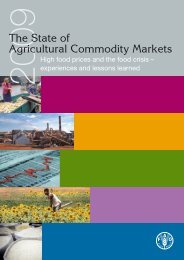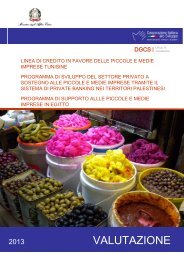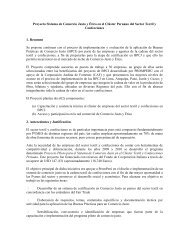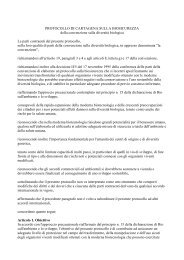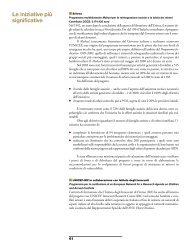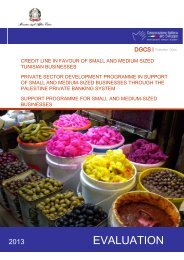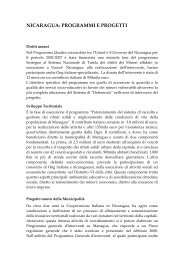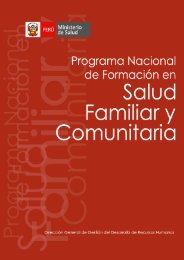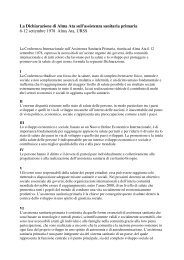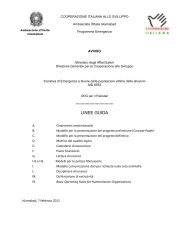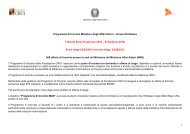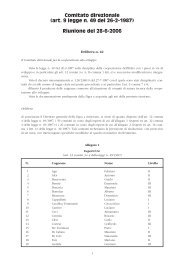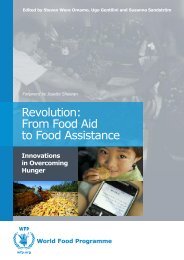witnesses, social operators - agree on the fact that the information and sensitisationcampaigns of the families should be increased and organised in a more capillaryway than has been done up to now. Some victims have insisted on the opportunityof a communication through mass media.“T<strong>here</strong> are many people in Nigeria that don’t know that their daughter left forEurope and died crossing from Morocco to Spain, you know many died t<strong>here</strong>,many died walking from Nigeria to Morocco. Many advertisements should bemade in the newspapers, shown on TV: those who have had experience come andtalk about these things (...). They should also start with a programme on TV onItaly which talks about these things. If the people continue to hear, perhaps sooneror later the people will say stop. One thing to make the families understand thatthis promise to the pimps is false, your daughter is the victim, they hit her, theymistreat her, she does not eat, she works, gets sick, maybe they kill her. T<strong>here</strong> aremany ways of dying on the street” (Interview Victim No. 4).In all these testimonies emerges the importance of a direct communication,without censure, which demonstrates, even through shock images, the moreextreme aspects of the conditions of life in which the women trafficked are obligedto live. Privileged destination of this communication should be the family and theschools.Considerations relative to the Nigerian social structure and the unequalenjoyment of the mass media in the different areas of the country bring us howeverto believe that, to have major efficacy, a direct communication to the family andthe community, through the testimony of emancipated victims of the exploitation,is required. The forms and places of this type of communication can be diverse:testimony of the women in associations and religious institutions, in schools, infamily reunions, in social moments of the community and villages.“In Nigeria one should only talk with the parents, show them the cassettes, tapethe girls who are on the street, t<strong>here</strong> are girls that are knifed, hot water thrown onthem, take these photographs, show them to the parents, translate them in all thelanguages that exist in Nigeria” (Interview Victim No.7).“A meeting could be arranged for the families to make the people understandhow the situation is <strong>here</strong>, which is not easy, above all for the youth, 16, 18, 20years that come <strong>here</strong>. We have made our bad life. Now we need to pray that themothers do not let their children come <strong>here</strong>. Because now many mothers are inagreement with their children” (Interview Victim No.2).A victim chose to recount her story to the family and the community sending aletter which, with the help of her brother, was distributed to all the family. Shechose to appeal to the sense of honour of the family. She maintains that her gesturecan help other girls to not follow the same outcome.“I wrote my entire story and sent it home, they must photocopy everything anddivide it amongst the family and during reunions of the family read it, like thisthose who say «my daughter is in Italy» should be ashamed. I wrote nearly 10pages and said «when this arrives, make photocopies» the last Sunday of eachmonth t<strong>here</strong> is a family reunion, all the elderly and adults come, I said “go t<strong>here</strong>,count these people who are t<strong>here</strong>, and leave a photocopy for each one, tell them to
ead or to ask someone in the house to do so. After you have read this piece ofpaper, if you go out and say my daughter is in Italy, you should be ashamed»”(Interview Victim No.5).Initiatives of sensitisation of this type, to have real effect, should be carefullyorganised, with a wide involvement of the NGOs, local associations, religiousorganisations, schools, and government institutions. The moment for informationshould not be disconnected from the life of the community.What appears to be important is the indication of a social operator according towhom the moment of information should always be accompanied by “a work onthe alternatives” (Associazione Tampep - Turin). It is evident in fact that even themost careful information has blunt weapons against the extreme need which, often,induces the family to push the daughter towards a “risky” migration path. Povertygenerates a disposal to believe, or to pretend to believe, in the promises of theexploiters, as a victim acutely explained: “If you are in need, you always believe”(Interview Victim No.7).The information towards the family could t<strong>here</strong>fore produce major results interms of prevention, as long as it is integrated with concrete support actions: invocational training of young women and above all in their accompanying to work.“You must be aware however that these are long term actions” (Associazione Onthe Road - Martinsicuro). Particularly efficacious in these projects, could be, atleast on a symbolic level, the direct involvement of ex victims, disposed to workcontemporarily on the level of the witness and on the level of preventive action.Even in this perspective, it would be important to evaluate the experiences and thealready existing projects for the support of the repatriated victims.The social operators agree, however, in maintaining that only a small number ofrepatriated women are materially available to carry out a direct role of sensitisation.The major obstacles are the social stigma, the financial and human difficulties thatalways accompany the forced repatriation.Two complementary paths can be envisaged for the direct involvement of theex-victims. The first path aims at evaluating the testimony of those who voluntarilychose repatriation, after a knowledgeable path of emancipation or however of thewomen trafficked and still resident in Italy, but ready to re-enter Nigeria toundertake the work of testimony. The second path is rather more arduous andpasses through the capacity to transform the forced repatriation into an occasion ofredemption. The reception, assistance, and accompaniment to the social reinsertionin Nigeria of the repatriated women could be placed at the service ofprevention. This challenge however needs an autonomous thorough closeexamination.Concerning the help action for the repatriated victims, the attention of theNGOs, associations, religious organisations that operate in Italy in support of theNigerian victims is very high. In all the operators interviewed t<strong>here</strong> is theknowledge that the forced repatriation today is for the victims a surplus of sufferingand a hard condemnation: in the best of the cases, to the social emargination in thecontext of origin; the repetition of sexual exploitation - in Nigeria or whetherthrough the re-starting of the circuit of the traffic - in the worst case. It is urgent
- Page 1:
TRAFFICKINGOF NIGERIAN GIRLSTO ITAL
- Page 5 and 6:
F O R E W O R D1. Objectives and st
- Page 7 and 8:
and who have identified the most si
- Page 9 and 10:
on the other hand, for those involv
- Page 11:
Case files analysed: Preventive det
- Page 15 and 16:
Table 2 - Socio-economic situation
- Page 17 and 18:
Table 3 - Nigerian citizens regular
- Page 19 and 20:
Table 5 - Social protection permiss
- Page 21 and 22:
Table 7 - Number of persons charged
- Page 23 and 24:
Table 8 - Detainee population sub-d
- Page 25 and 26:
and the United States enables this
- Page 27 and 28:
C H A P T E R IW a y s a n d p h a
- Page 29 and 30:
Figure No.2 - Edo State.It is not c
- Page 31 and 32:
Nigeria. From 1996 in Benin City an
- Page 33 and 34:
In this variegated framework, the d
- Page 36:
“Benin City is one of those State
- Page 39 and 40:
Various privileged witnesses of the
- Page 41 and 42:
In the first years of the traffic o
- Page 43 and 44:
pay considerable sums for lodging,
- Page 45 and 46:
The routesWe find at least three ty
- Page 47 and 48:
Figure No.5 - Trafficking routes th
- Page 49 and 50:
The journey overland through Africa
- Page 51 and 52:
new dispositions and contacts to co
- Page 53 and 54:
Then he sends her in a taxi to the
- Page 55 and 56:
T. remains in this house for 21 day
- Page 57 and 58:
detainees go towards the refectory,
- Page 59 and 60:
At this point the organisation esco
- Page 61 and 62:
was accepted by the Ivory Coast pol
- Page 63 and 64:
B.E. «Yes, I was given a Ghanaian
- Page 65 and 66:
Now the documents are “hired”:
- Page 67 and 68:
It is understood however that the v
- Page 69 and 70:
“There is no Nigerian passport wh
- Page 72 and 73:
C H A P T E R I VL i v i n g a n d
- Page 74 and 75:
have no shop and then there is no p
- Page 76 and 77:
The cost to manage the house and th
- Page 78 and 79:
mine since a long time, he can’t
- Page 80 and 81:
A feminine managementIn analysing t
- Page 82 and 83:
“There are many pimps that when y
- Page 84 and 85:
The control of movementThe fact tha
- Page 86 and 87:
Physical punishments can be made by
- Page 88 and 89:
Control between psychological subje
- Page 90 and 91:
arms), tortured in many different f
- Page 92 and 93:
C H A P T E R VT h e o r g a n i s
- Page 94 and 95: Each penal procedure on the subject
- Page 96 and 97: Often it is the same madam who move
- Page 98 and 99: Even in numerous recent criminal pr
- Page 100 and 101: work arrangements (…) persons tha
- Page 102 and 103: man all the money she had in the ho
- Page 104 and 105: in the plates and everything and th
- Page 106 and 107: exploitation) has reached an amount
- Page 108 and 109: C H A P T E R V IT h e e n d o f t
- Page 110 and 111: A: «You have to bring me a present
- Page 112 and 113: Often the family is however not abl
- Page 114 and 115: the different evaluations of the as
- Page 116 and 117: The discussions on the possibility
- Page 118 and 119: eal results: to distance herself fr
- Page 120 and 121: of a different culture is very impo
- Page 122 and 123: C H A P T E R V I IC o n s i d e r
- Page 124 and 125: In the case of the girls having mor
- Page 126 and 127: As has been many times noted, the c
- Page 128 and 129: under the profile of the “quality
- Page 130 and 131: person to obtain either relevant re
- Page 132 and 133: Numerous are the criminal juridical
- Page 134 and 135: If the accused claims to not knowin
- Page 136 and 137: sanctions, sometimes, also in prese
- Page 138 and 139: d) Investigative and judiciary co-o
- Page 140 and 141: The reform foresees, under Art. 1,
- Page 142 and 143: which the woman can definitively tu
- Page 146: and necessary, therefore, to think
- Page 149 and 150: in many cases they are driven to th
- Page 151 and 152: Melossi, D., (2002), “Le teorie s



